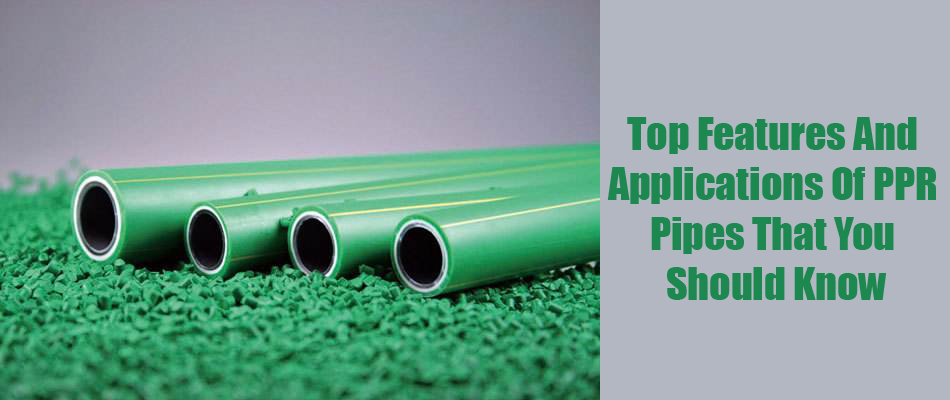Are you looking for a pipe that can meet all your plumbing expectations? Then, a PPR water pipe is a good option. PPR water pipes provide numerous advantages over traditional pipes made from steel, cement, or cast iron. Made from Polypropylene Random, these pipes provide thinner wall thickness and a higher fluid flow volume than cement pipes. Besides, they have a lesser density and are lightweight. That’s not all!
Due to their versatile nature, these PPR water pipes can be utilized for several commercial and residential projects and also in areas such as irrigation, pollution discharge, drainage, heating, pharmaceutical, and farming. This article will take you through the various features and applications of PPR pipes that you should be aware of before going for a purchase.
Long Shelf life
A primary feature of PPR water pipes is that they come with a long shelf life. Due to its high endurance to all climatic conditions, it can last longer than many other pipes available in the market. This implies they are composed of unique properties that allow the pipe to function effectively for upto 50 years or longer.
Low Maintenance
PPR water pipes do not need regular maintenance. However, users can conduct occasional maintenance by calling a professional to keep them working for an extended period.
Corrosion Resistance Properties
PPR water pipes are constructed of essential components that keep them from corroding, rusting, or developing bacteria. This means that the pipe does not form rust when exposed to harmful environmental conditions. This factor also contributes to its high longevity.
Easy Installation
PPR water pipe is lightweight and thus, can be carried, handled, and installed quickly without requiring a lot of energy or strenuous activity. They’re also easy to cut, connect, and operate, and thus, users can do it all by themselves.
Low Thermal Conductivity
PPR fittings have low thermal conductivity. This makes them an ideal choice for both hot and cold water usage. Due to this property, they are widely used in modern buildings and glass wool insulation systems to enhance energy efficiency.
Chemical & Mechanical Endurance
PPR has a much higher resilience to abrasion by harsh particles than standard plastic piping systems. This is especially significant in circumstances where the transferred liquids contain abrasive particles, such as well water or industrial uses.
Unlike traditional metal pipes, PPR is also inert to most chemicals and electrolytes across a wide temperature range. As a result, PPR piping is safe to use in high water salinity and even in highly corrosive environments because of its electrolytic and chemical nontoxicity.
Efficiency in terms of both the environment and the economy
PPR water pipes are light enough to carry, handle, and install without consuming a lot of energy or requiring a lot of manual labor. At the same time, they’re simple to cut, connect, and operate with, making them much more cost-effective. Furthermore, connecting PPR fittings is done entirely by heat, with no added chemicals or materials required. These aspects contribute to PPR’s common environmental effect and low consumption cost.
High Durability
PPR water pipes have a high resistance to abrasion induced by harsh particles. As a result, they are sturdy and have a long lifespan. They do not break or crack easily and can be used for many years. PPR water pipes are also easier to install and immune to electrolysis, damaging any constructed plumbing system.
Non-Toxic
PPR pipes are composed of non-toxic basic materials, and therefore, they are a safe choice for supplying fresh and hygienic drinking water. In addition, they do not contain harmful elements and thus, do not affect the consumer’s health.
Low Friction Tendency
PPR water pipes have a smooth inner surface, and therefore, the chances of friction during the water passage is low. In addition, the water can move seamlessly within the pipe as there is no flak or scaling than the metal pipes.
Leak-Free Performance
Since PPR water pipes do not react to corrosive environments and are made of high-quality components, they are an efficient choice for a leak-free water supply. In addition, the components do not allow the pipe to break or become weak in unwanted climatic conditions. Thus, the water is supplied to the other end without any wastage.
Applications Of PPR Pipes
PPR’s durability, cost-effectiveness, and environmental benefits have led to its growing range of applications in recent years. In domestic, industrial, and public systems, cold and hot potable water pipes are among the most popular PPR water pipe applications. Besides, sanitary liquids, water, packaged foods, compressed air, and aggressive chemicals, such as highly acidic or alkaline solutions, are also transported by industrial plumbing.
Now you know what the different features and applications of PPR pipes are. So, if you decide to buy them, make sure you acquire them from recognized vendors to be certain of their quality. Also, consider these features before purchase and ask the vendor about them and you will make a long-term suitable investment on an efficient PPR pipe.
